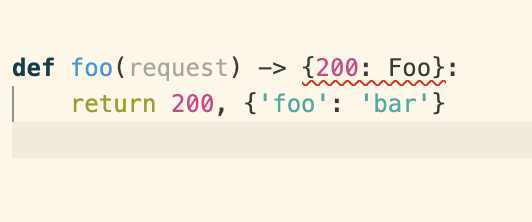Hi @fojetin Initially django-ninja had responses done with return annotations... But it was not covering all cases (like multiple response models and codes #16 ) and looked too long in practice
Closed fojetin closed 1 month ago
Hi @fojetin Initially django-ninja had responses done with return annotations... But it was not covering all cases (like multiple response models and codes #16 ) and looked too long in practice
multiple response models and codes works
>>> def login(request, payload: int) -> {200: str, 401: int, 402: str}:
... pass
...
>>> login.__annotations__
{'payload': <class 'int'>, 'return': {200: <class 'str'>, 401: <class 'int'>, 402: <class 'str'>}}I think it seems pretty
def some_longlonglonglonglonglonglonglonglonglong_api_method_name(
some_param: int,
some_more: str,
more: int,
crazy_long_param_name: str,
one_more_big_param_name_like_snake: int,
) -> {200: int, 400: dict}:
passand of course we should keep the ability to specify response in decorator
Why i really wants to make it, because i want to defining endpoints and their schemas in many files and register them to API in one other file.
In this moment i should do this:
def add(request, a: int, b: int):
return {"result": a + b}import add
router = Router()
router.get("/add", response=t.Dict[str, int])(add)
This splits the request and response schema into different files.
Or i think we should add multiple inheritance using router
like router.add_router(func)
hm.. that's interesting approach
ok, I think I will add both options - with responnse argument and return-type-annotation
but there is a big typing issue if you will use annnotations:
1) mypy will not validate this:

2) Even for one result mypy will not validate it
def foo(request) -> Foo:
return {'foo': 'bar'}Yeah, mypy not validate this, but flake8 returns no errors
Recent on-boarding experience with django-ninja:
Everything was clean and as expected ( I did not even need the docs, everything was super intuitive. ), up until the return schema handling.
So this kind of breaks the flow.
Despite this I really enjoy it so far!
I have checked the corresponding issues with FastAPI, this is still unresolved over there.
I like the idea of a InferringRouter, keeping the backwards compatibility.
https://fastapi-utils.davidmontague.xyz/user-guide/inferring-router/
I only tested trivial cases, though I don't think this is too invasive.
import uuid
from ninja import Router, Schema
from ninja.constants import NOT_SET
from typing import TYPE_CHECKING, Any, Callable, get_type_hints, List
from apps.users.models import User
class InferringRouter(Router):
"""
Overrides the route decorator logic to use the annotated return type as the `response_model` if unspecified.
"""
if not TYPE_CHECKING: # pragma: no branch
# as in: https://github.com/dmontagu/fastapi-utils/blob/master/fastapi_utils/inferring_router.py
# def add_api_operation(
# self,
# path: str,
# methods: List[str],
# view_func: Callable,
# ** kwargs: Any
# ) -> None:
# if kwargs.get("response") is NOT_SET:
# kwargs["response"] = get_type_hints(view_func).get("return")
# return super().add_api_operation(path, methods, view_func, **kwargs)
def add_api_operation(
self,
path: str,
methods: List[str],
view_func: Callable,
*,
response: Any = NOT_SET,
**kwargs: Any
) -> None:
# I like this a little better then fiddling around in the kwargs with string keys.
if response is NOT_SET:
response = get_type_hints(view_func).get("return") or NOT_SET
return super().add_api_operation(path, methods, view_func, response=response, **kwargs)
router = InferringRouter()
class UserOut(Schema):
email: str
telephone: str
uuid: uuid.UUID
@router.get('/test/')
def pay(request) -> UserOut:
return User.objects.first()
hi @kristofgilicze
Indeed overriding Router.add_api_operation is the recommended approach for making return annotations marked as response schemas
Ok!
Is an InferringRouter something that will be eventually included in the module, or you prefer to keep the module API in sync with FastAPI?
@kristofgilicze
well this is a very controversial part.. lot of people would like to see this built in and lot of other people are strongly against it (because it just break type-checking )
I think for now I will just add some sort of best practices section to documentation where this example will be outlined and tests covered
what about supporting the type annotation in "simple" cases, e.g. when it's a single value, since that is also accepted by mypy?
for the case when the annotation is not set too
if response is NOT_SET:
response = get_type_hints(view_func).get("return") or NOT_SET
In this moment ninja use decorator param to find response schema.
@api.post('/login', response={200: Token, 401: Message, 402: Message})@api.get("/tasks", response=List[TaskSchema])@api.post("/users/", response=UserOut)I think we should use python annotation like as request schemas
def login(request, payload: Auth) -> {200: Token, 401: Message, 402: Message}):def tasks(request) -> List[TaskSchema]:def create_user(request, data: UserIn) -> UserOut:We can take this schema
funcion.__annotations__.get('return')@vitalik what you think about this enhancement? I want take on this task!